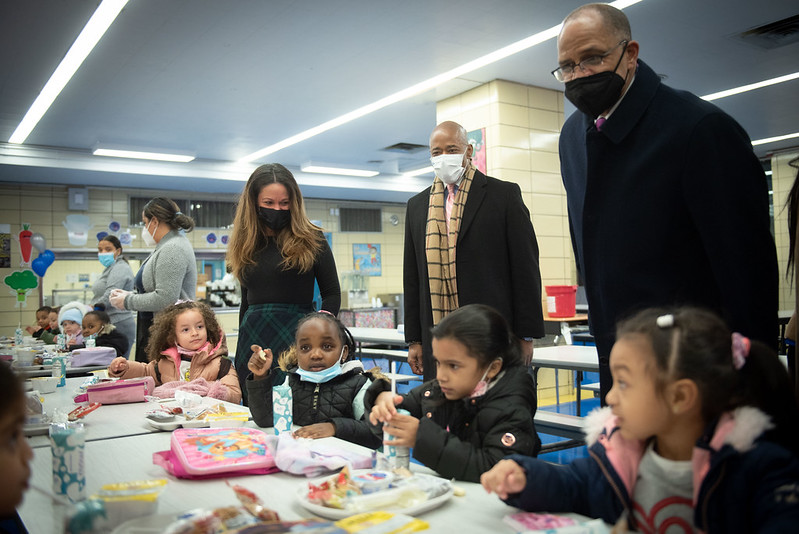
Mayor Adams and Chancellor Banks at a school (photo: Michael Appleton/Mayor's Office)
In an interview late last year, New York City’s new schools chancellor, David Banks, vowed to “transform the lives of…[New York City] children, but particularly Black and brown children who have struggled the most in this system.” While all students have struggled during the pandemic, multilingual learners, students in the foster system and in temporary housing, and students with disabilities—who are disproportionately Black and brown—have faced additional challenges, as the pandemic has exacerbated enduring opportunity gaps and academic disparities.
At the same time, the city has more resources for education than ever before. For Chancellor Banks to deliver on his promise, he must focus on targeting and increasing resources for these special student populations.
Data available from the New York City Department of Education (DOE) make it clear that many special student populations fail to receive the support they need. Students in the foster system were approximately 3.5 times more likely to repeat a grade than all other DOE students, according to data from the 2015-2016 school year (the most recent available). In 2019, less than one in five multilingual learners were proficient in math. And January 2021 data reveal increased absenteeism during the pandemic for multilingual learners, students with disabilities, and students in shelter.
With increased funding, the new city administration, working with the City Council, has a historic opportunity to invest in ambitious and equitable programs that focus on the unique needs of students from special populations, and ensure students’ access to fully participate and thrive in them.
Throughout the pandemic so far and over the next several school years, the DOE will have received immense sums of federal covid-related education aid, including $7.3 billion for elementary and secondary education (on top of regular federal funding for education) and a significant portion of the nearly $59 million in federal aid awarded to New York State for students in temporary housing. State funding is also increasing, notably through the state’s commitment to finally fully fund Foundation Aid in the coming years. This school year, the DOE is receiving $11.8 billion from the state, including $8.6 billion in Foundation Aid. With these investments, the DOE’s 2021-2022 budget is $38 billion, which includes departmental allocations toward expanding early literacy, special education, 3-K, culturally-responsive curriculum, and other priority programs.
However, some of the DOE’s programs that were funded by covid-relief dollars—such as Summer Rising—were difficult to access for many vulnerable populations, exacerbating the challenges for students who had already faced more barriers to school early in the pandemic. Some advocates attributed access challenges to limited busing options, outreach failures, and communication gaps.
One immigrant parent of two multilingual children told us that she feels like her children are excluded from new DOE programs because of language barriers. “My daughter’s school always sends me those robocalls in English and never uses a translator except for IEP meetings. They send me papers in the mail, but they are in English. I have to talk to somebody to figure out what they’re saying,” she said in Spanish. “More than anything, I want [my children] to achieve their goals.”
Children like hers, and so many others across the city, deserve better. Chancellor Banks can deliver on his commitment to transform the lives of Black and brown children by taking the following steps:
1. Utilize existing outreach structures—and create new ones—to reach special student populations and their families.
The DOE should mobilize existing staff (parent coordinators, social workers, recently-announced central foster care staff, and others) to ensure that students and their families have access to new programs. Additionally, the DOE should develop new outreach strategies with input from parents, students, and other key stakeholders who are members of historically-underserved communities, including partnering with community-based organizations that have trusting relationships with these families.
2. Create targeted academic programs and provide necessary services to enable full participation.
Students in special populations need targeted academic support provided by appropriately-trained staff to address ongoing challenges and ensure unencumbered access to programs (whether they are offered after school, in school, or on weekends), including transportation, paraprofessionals, and quality translation and interpretation services.
3. Collect and share participation data for new programs targeting special student populations.
The DOE should gather and publish this data for individual special student population groups and disaggregate by race, ethnicity, gender, and geographic district to better understand who has access to city programs and address gaps.
4. Develop trauma-informed programming that targets the whole student.
Supports must help students in special populations process their emotions and help them to persist through their education. School staff must be trained to understand the effects of trauma and adverse childhood experiences, how they manifest in the classroom, and how they can encourage positive social-emotional interactions.
The pandemic has highlighted systemic challenges within our schools that impact all students––especially the most underserved. Students in special populations need targeted supports and transformative change. Mayor Adams and Chancellor Banks have a historic opportunity and unprecedented funding—including Governor Hochul’s proposed future increases in state aid—to ensure these students have the opportunities they need to succeed. They must make good on their promise.
***
Alejandra Vázquez Baur and Chantal Hinds are Policy Entrepreneurs at the Next100 think tank, where they work on issues related to educational equity, students involved in the foster system, and immigration justice. On Twitter @TheNext100.
***
Have an op-ed idea or submission for Gotham Gazette? Email This email address is being protected from spambots. You need JavaScript enabled to view it.